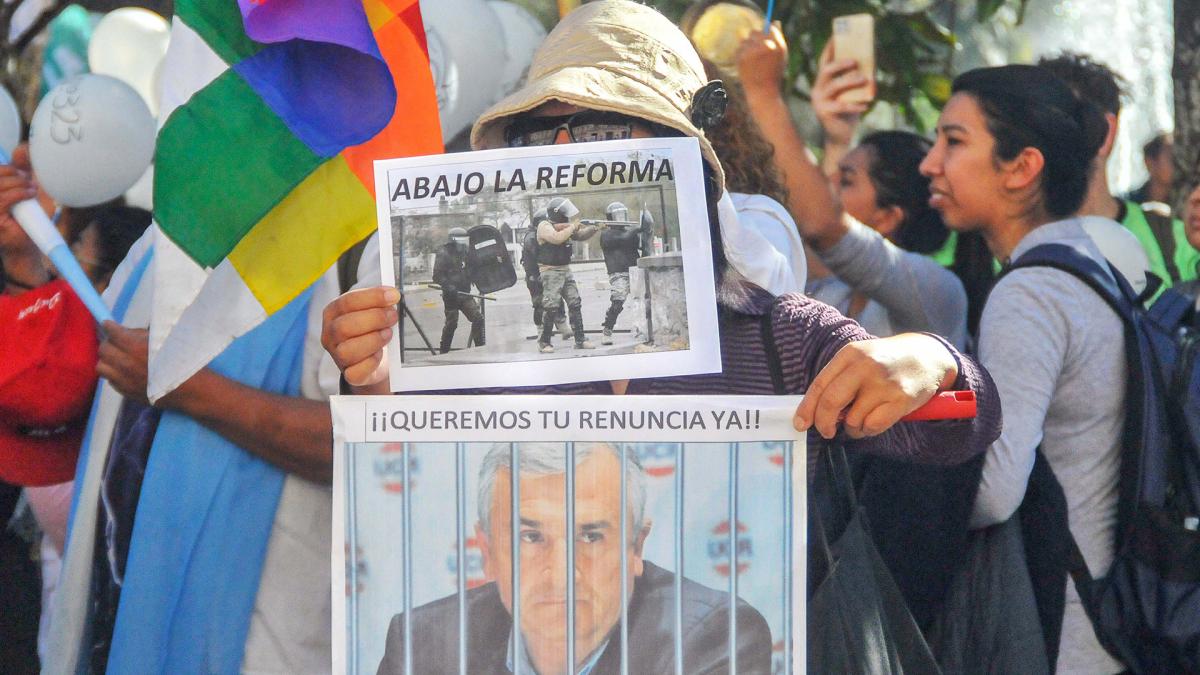
On July 13, hundreds of people returned to the streets across Jujuy, Argentina, to demand the abolition of the new provincial constitution and the release of the people arrested the day before. Photo: Edgardo Valera/Télam.

Orinoco Tribune – News and opinion pieces about Venezuela and beyond
From Venezuela and made by Venezuelan Chavistas

On July 13, hundreds of people returned to the streets across Jujuy, Argentina, to demand the abolition of the new provincial constitution and the release of the people arrested the day before. Photo: Edgardo Valera/Télam.
The police raids of activists’ homes, the university, and arrests have been condemned by human rights organizations across Argentina which have raised concerns about respect for human rights in the Jujuy province.
On July 12, the judiciary of Argentina’s Jujuy province, ordered the arrest of over 40 people, who participated in a massive march in the city of Humahuaca on June 30. The march was organized in rejection of the reforms to the Provincial Constitution, promoted by conservative Governor Gerardo Morales of the right-wing Radical Civic Union party.
According to reports from provincial human rights organizations, the local police raided the homes of at least 22 members of different social organizations and trade unions, and arrested three people: two municipal workers and a student. Local media reported that they were asked to come with the officers to hear the accusations against them, but then were arrested immediately. In many cases, the families didn’t receive any information about the whereabouts of those arrested for hours.
Meanwhile, provincial teachers and students’ organizations condemned the illegal entry of the police into the National University of Jujuy. The police entered the campus without authorization, apparently to learn about the decisions of the Superior Council of the university regarding the new constitution. The university rejected the move, highlighting that it violates its autonomy and academic freedom. At the same time, students’ organizations pointed out that educational institutions are gun-free zones and that the unsanctioned entry of armed police is prohibited by the Argentine constitution.
Argentina: Jujuy Protests Continue as Indigenous Communities Demand Repeal of Constitutional Reform
The complaint against the protesters was filed by members of the Humahuaca City Council and the search and arrest warrants against them were requested by prosecutor Enrique Alancay. These repressive measures by the provincial government were rejected by human rights organizations across the country, who raised concerns about respect for human rights in the province.
The Center for Legal and Social Studies (CELS) noted that all defendants were accused of “serious crimes such as sedition and deprivation of liberty so as to ensure that they are detained and that (the legal actions) generate fear.”
The organization added that “the persecution is aimed at demonstrators, social leaders, Indigenous people, and human rights defenders” and stressed that “the criminalization of protest not only affects the persecuted and detained people but also seeks to limit the right to demonstrate and silence those who oppose the policies of the Jujuy government.”
In the face of increased harassment by the Morales government, on Thursday, July 13, hundreds of people returned to the streets across Jujuy to demand the abolition of the new Constitution and the release of the people arrested the day before. They rallied under the banner of “We demand that the persecution of comrades in struggle cease. Up with our Rights, Down with the Reform.”
Argentina: Police Repression Continues in Humahuaca, Jujuy Province
Since June 5, the people of Jujuy have been peacefully demonstrating for better salaries for school teachers. On June 14, Indigenous communities, social organizations, and other sectors of the population joined their struggle, also calling for withdrawal of the “reforms” to the Provincial Constitution, which were approved on June 15 without the necessary prior consultation with the citizens. The people of Jujuy have strongly rejected the new Constitution, calling it “unconstitutional” and “regressive.”
Jujuy’s new constitution prohibits the blocking of streets and roads and penalizes any other disturbance to the right of free movement of people. Provincial human rights organizations have said that it indirectly criminalizes the right to protest. Additionally, the new constitution does not recognize the rights of the Indigenous peoples enshrined in the National Constitution, and promotes the provincialization of natural resources such as land and water. Indigenous movements and social organizations have condemned the constitution for enabling the displacement of Indigenous communities that inhabit territories rich in resources and for denying them their collective rights to ancestral land and territories.
Popular discontent has escalated due to brutal police repression against the protesters. It is important to note that the Jujuy police violently repressed the demonstration in Humahuaca on June 30, leaving dozens of people seriously injured, with some losing their eyesight.
(Peoples Dispatch)
BLA